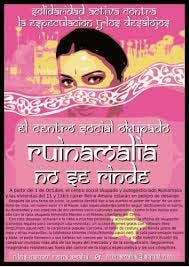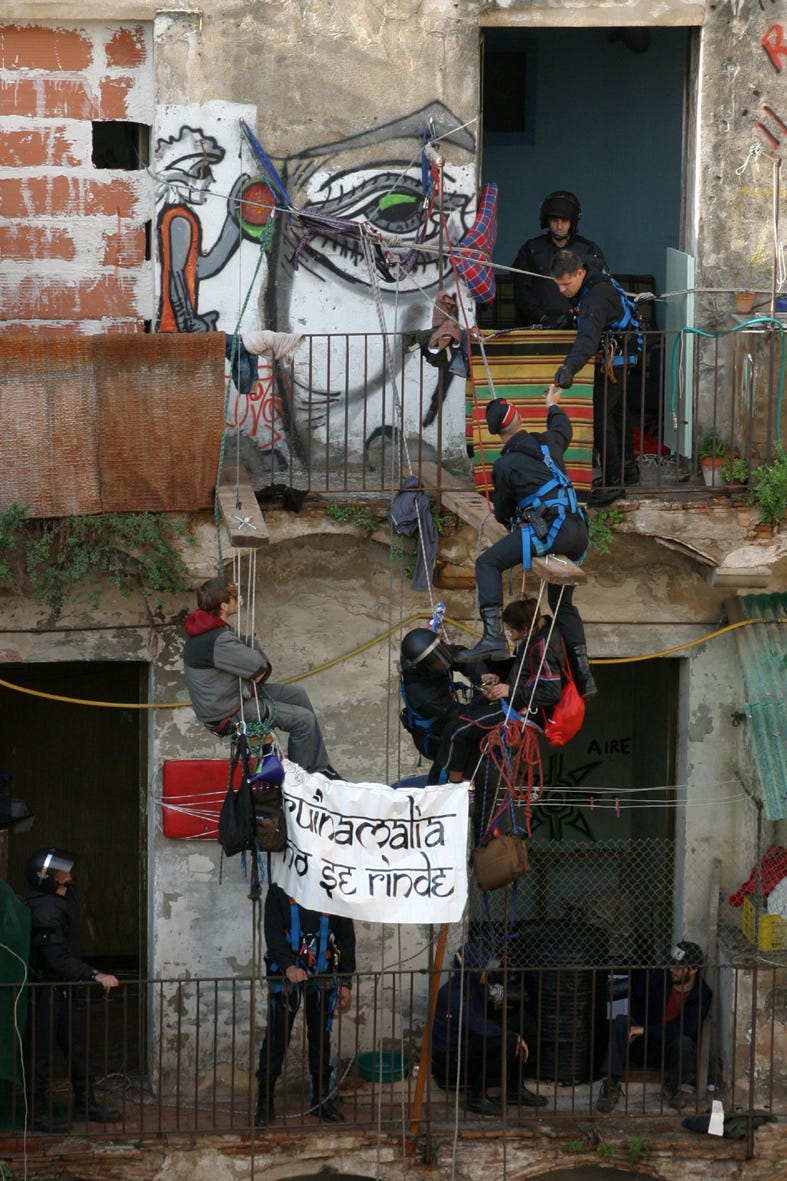A Day for Books and Flowers
Yesterday found me back in Catalunya on the day of St. Jordi, which is a special holiday for the Catalans and a special anniversary for me. It was sixteen years since I was arrested at what was supposed to be a tranquil little protest, which ended up being the reason I lived here until now.
No one remotely familiar with the St. Jordi tradition would pick that day for a rowdy protest, much less one that ended with explosives charges. Historically, you’re supposed to gift your male friends a book that day, and your female friends a flower. As you can imagine, the binary has been loosened up a good deal, and nowadays the streets are crowded every St. Jordi with book vendors, some but not all of them also offering roses, paper or real, and if you’re lucky you’ll end up with a few of each.
Since that first holiday, I’ve spent most 23rds of April setting up a distro with friends. It’s one of those days of exception that if you’re not angling for prime real estate even anarchists can peddle our wares without permits. And since plenty of people see anarchism as part of Catalan history, Catalan culture even, plenty of folks who don’t participate in social movements might pick up a copy of La Anarquía Funciona or Durruti en la revolució.
That first St. Jordi, though, I had been in Barcelona three weeks, and thought I’d be there just one more. I had been travelling for a year, biking and hitchhiking around, sleeping in parks and then graduating to making friends and staying in squats, learning about anarchist movements across Europe. Berlin, Kobenhavn, Groningen, Kyiv, Craiova, Sofia, Thessaloniki, Athens, Torino, the mountains outside of Genova. I was committed to going back to Virginia, the whole plan having been to learn from other movements and different contexts and come back with some inspiration, since we were barely connected to a broader anarchist movement back in the ‘00s.
Things were maybe a little more complicated though. I might have fallen in love with someone in the Netherlands, and she was actually coming down to meet me a week later. We were going to hitch back to Groningen together and then figure out what to do. So I was being pulled in two directions, but neither of them involved staying in Barcelona.
Though I had brushed up on my German and Russian and learned a good bit of Dutch, I barely spoke any Spanish, much less Catalan. Nonetheless, I had been filling my days to the brim. Some people had welcomed me in and included me in their organizing. At that moment there was an ongoing wave of repression against the squatting movement, with several squatters in jail awaiting heavy charges, and a network of squatted social centers were organizing a response. They had planned a month of actions, ranging from the communicative to the disruptive and beyond. On one of those days the preeminent association of property owners in Barcelona got a surprise visit when a masked crew burst into their meeting with a bucket of actual shit, dumping it on their fine mahogany table. No arrests.
My special day, though, was supposed to calm and risk free (otherwise they certainly wouldn’t have invited a gringo who’d only been around a few weeks). The plan was a cercavila (the Catalans have a dozen words for protest), which is where you walk around a neighborhood making a little noise, stopping at certain locations you want to draw attention to, read out a text, do a little skit. The purpose can be to celebrate or denounce, but either way you’re rooting yourself in the territory, visibilizing a certain balance of powers, demonstrating certain things that belong to us or that they’ve stolen or are trying to steal from us, pointing a finger at their seats of power or the shameful things they’re trying to get away with.
I didn’t understand many of the stops on that cercavila, though by the time it ended I had puzzled out the meaning of most of the flier that was being given out by the thousands. Just as it was wrapping up and I was already leaving to meet a friend, there was an enormous boom behind me, a shockingly loud firework. After I’d spent one St. Joan in Barcelona, it seemed like a reasonably large firework, but pyrotechnics aren’t part of the St. Jordi tradition.
A huge crowd had gathered, some upset, some laughing. The cloud of smoke lingered, and little burnt bits of flier drifted lazily from the sky. A fine coating of sand lay over the ground, the stalls of books, everything. Then cops arrived on the scene, the first ones to bring an air of panic and danger. By that point most of the protesters had melted into the crowd, and those who hadn’t got right to it. The guy holding the banner, who later in the jail cell would explain to me the meaning of pringado, ended up being the last one. He took off running.
When I saw all the cops go after him, I followed. After all, back in the States one of the projects I worked on was Cop Watch, which instilled in me the importance of witnessing arrests to dissuade police violence, make sure they weren’t planting anything, give some quick legal advice (never talk to cops!). Somehow, in a year, the lesson hadn’t sunk in that the kind of behaviors police tolerate differs vastly from country to country. Case in point, in the US the police will frequently just shoot you (especially if you’re racialized, a protester, having a mental health crisis) but they usually act like there’s nothing they can do about people filming them. Not so in España.
In this case I wasn’t filming, just watching as they threw my new comrade up against the wall where they’d caught up to him. And quickly realizing that the only other people standing around watching were undercovers. Eventually they realized it, too. One of them asked me a question, and I replied in my best English that I couldn’t understand them, that I was a tourist. By 2007 in Barcelona, they’d heard that one before. One of the cops took my passport and I had to follow him into the police station. Which competes for most humiliating arrest with that time in New York when they fished up a big group of us with plastic netting. That one probably wins since I didn’t keep up with the paperwork and missed the big payout a few years later.
In the dungeon of the police station, they were working Javi over, calling him a terrorist, threatening him, roughing him up. When they brought me down, they threw him a curve ball, changed their tone, asked him who I was (never talk to cops!). When he answered, they knew I wasn’t just a passing tourist.
We went before the judge a few days later, and the cops were saying it was a bomb in a crowded street and a few people were injured. That was a lie. It was an unexpectedly loud firework (on my own insistence I didn’t find out the story behind that fumble until after the trial), and the cops had convinced a Mormon tourist who didn’t like protesters to make a complaint because he’d been “scared” and they’d pressured two old people who had a ringing in their ears to also sign a vaguely written complaint, telling them that if they woke up deaf the next day they wouldn’t be covered if they didn’t sign.
Fortunately, they testified as much at our trial two years later, along with several book vendors clearly stating that the only people who were panicking after the firework went off were the police. But when we went before the pre-trial judge he had every excuse to bring down the hammer. The charges, “public disorder with explosives,” carried a minimum sentence of three years. After yelling at me for a while, telling me that in the US they would stick me in Guantanamo for what I’d done, he gave me preventative detention with a bail that was modest by US standards. Not so in Spain, though, since they don’t have a bond industry. The judge’s secretary actually apologized to me because it was the heftiest bail she’d ever seen in I don’t remember how many decades working there. But all the social centers in the city came together, emptied their piggy banks, and I was out in a week.
I wonder about the indignation of judges. How much more cynical they must be than cops. I don’t think anyone could be imperceptive enough to work around cops for more than a year—to consistently rely on their testimony—and to believe that police were an honest lot, that manipulation weren’t a part of their job description. I guess if you deal all day with questions of right and wrong, if you operate in a universe where different sides in a conflict can’t both be right and you have to prove one or the other, the truth doesn’t matter as much as the appearance of truth, as what can be proven. It must be an ethically deadening way to go through life.
By the time trial was over, I spoke Spanish and was working on my Catalan. Most of my friends back in Virginia had moved on to other places, so there wasn’t much reason to go there. And after several decades of pacification, things were starting to heat up again on the streets, and social movements were getting stronger. Not as a consequence of the economic crisis, but preceding it. That, though, is a story for another time.
Images from the eviction of a social center later that same year.







